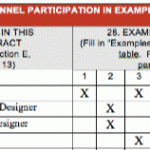
I see it all the time. People go to networking events and immediately give people a reason to distrust them. And worst of all, they have no idea they are doing it. So, I’m going to explain what this mistake is and give you an easy way to avoid it.
But first, let me tell you a personal story.
I used to say, “I’m not a shmoozer.” I hated going to networking events because I had to turn into someone else, someone that wasn’t me.
Oh man, it was painful. Here I was walking into an event with people twice my age. I was wearing a suit and tie, which would only come out for funerals and networking events.
I knew what I had to do…get these people to give my firm work. I had to get these people, who I had nothing in common with, to like me so I could steal away their project before someone else did. It was a lot of pressure, which made me nervous.
Just going up to people, knowing that I wanted something from them, was awkward. But I put on a big smile and did my best to play mister friendly sales guy (you know the person we’ve all met a million times).
If that wasn’t bad enought, People would come up to me, grinning ear to ear. Oh no, these people were coming up to me looking for work! I worked at an M/E/P design firm. Most of our work was as a sub. I had no work to give these people. And even if I did, I had no authority to give it to them. And worst of all, I could tell these people were being FAKE. So, those encounters were even more awkward because I was immediately on the defensive.
And guess how much work I brought in from these events. That’s right, none! Did I mention I hated networking events?
How I Learned To Stop Being FAKE and Enjoy Networking
One day, I met a guy who literally changed my life. You probably know who I’m talking about. I cold called him asking for some help and he went well out of his way to help me. This guy didn’t know me from Adam.
I was impressed. So, I researched him. What was his deal? I learned he was a christian, which coming from a strict Methodist family at least gave me confidence that this guy was on the up and up. I read his writing and it turned my world upside down. In short, what the networking approach this guy promoted seemed batsh*t crazy. But at this point, I had failed enough to at least listen.
The Secret To Successful Networking
We eventually became friends. And he taught me the secret of successful networking, which was to completely change my mindset. He said instead of getting something from people at these events, my goal was to help them. It was almost like a game (and I love games). How many people in this room can I help?
He even brought me down to DC to see him in action. It was impressive. Everyone loved this guy. Who wouldn’t love someone that helped everybody everyday. And this guy was bringing in millions for his firm.
I tried his approach. It was a huge relief. It was no longer awkward to go up to people because I was going up to determine how I could help them, not to get something from them. And when people would come up to me, I had no work to give them but I had to figure out what I could do to help them in some way. It was a very intriguing game.
And best of all, I could be myself. It didn’t matter what I wore. It didn’t matter what I said (as long as it was in the realm of decency). I could be myself as long as I found a way to help everyone I met. I could be genuine. I could be Matt.
I was now more comfortable at networking events. I was much more effective. And I was being me.
It turns out it was MY approach, the approach everyone else was also using, that was batsh*t crazy, not his. I was trying to be someone else. What was I thinking?
Being Genuine
The line between being genuine and being fake is thin. We feel we have to be our best at business functions. But here is the thing that boggles my mind…
Do we really think people can’t tell when we are being fake?
Whenever someone comes up to me and is playing “Mr./Ms. Super Friendly Networker,” when they really aren’t, I can spot that immediately. Humans are amazing at identifying patterns. It’s really our evolutionary advantage. So, when someone is being fake, we can tell. We immediately don’t trust them because we know they are being dishonest on some level.
We can always tell when someone is being fake. Yet, we think our clients or contemporaries somehow lack that ability. It’s ludicrous. Of course they possess the same innately human abilities we do. They can tell when we are being fake.
So, stop being fake.
Be real. Be genuine. Be yourself, but behave within the bounds of professionalism. Don’t be mean. Don’t show prejudice. Don’t be vulgar. But be you.
You are awesome. We want to see you. We want to meet you.
We can tell when you are not being you. You are not fooling anyone. We don’t trust people who are fake. We don’t like people who are being fake. You are not gaining anything by being fake.
Even if you didn’t buy Networking Like an Introvert (that guy’s book). Even if you choose not to help everybody everyday. At least choose to be genuine, because otherwise you are kicking yourself in the foot.
Key Takeaway: Be real. We’ll thank you for it and you’ll benefit.
If you liked this article, please subscribe below or on the right side of the homepage. If you want to give us your thoughts on this issue, please leave a comment.





Matt: I enjoy your blog. I wanted to share that this is great advice for job seekers too. I wrote about it in 2009 as advice on networking with results. See my counsel halfway down the page? It matches yours! (link above or here http://blog.redmondsearch.com/job-searching-get-out-from-behind-the-computer/ )
I’d love to see you in action at a networking event!
Ok, Thank you.
Great post, very insightful in the whole awful networking experience. As I was reading I’d hope you’d give an example on how you were able to help people. It just seems a little vague.
Still, I love the whole making sure to emphasize that you are trying to offer them something rather than looking for an offer from there. Sounds like a hard egg to crack.
There are many examples. It can be anything from introducing them to someone to giving them an item they would find useful. It could even be providing them with some free service.